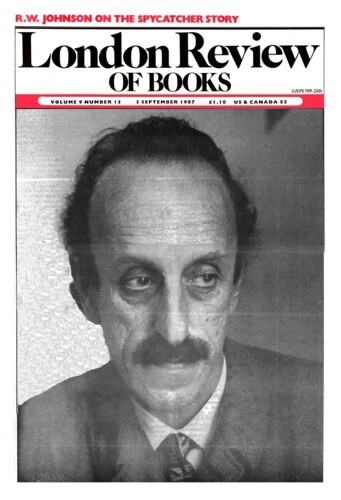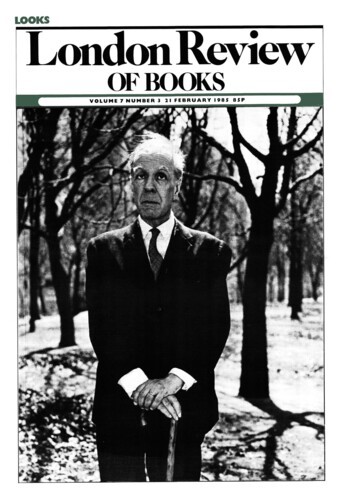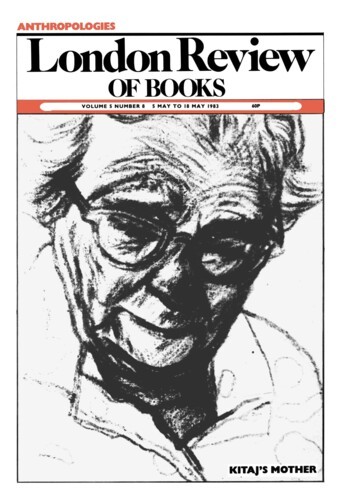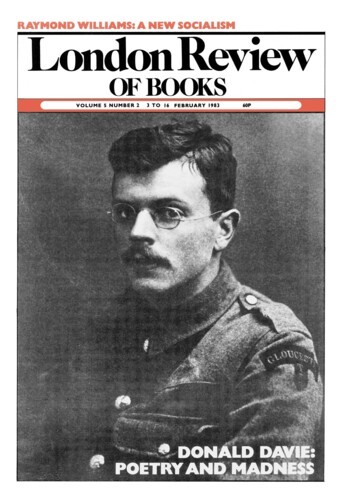Paul Delany
Paul Delany is a professor of English at Simon Fraser University, British Columbia. He is the author of D.H. Lawrence’s Nightmare and is now engaged in writing about Rupert Brooke.
Men in Love
Paul Delany, 3 September 1987
Lawrence’s maxim ‘we shed our sicknesses in books’ is usually applied to Sons and Lovers, where he disposed of his nearly fatal over-attachment to his mother. But Women in Love is a cathartic novel too, though here the sickness is less easy to cure. The sickness itself is obvious enough: it is misanthropy, a continuous rage at almost everyone around. If Lawrence did not manage to shed it he at least made his most strenuous attempt in Women in Love to probe, and to judge, the ‘indignant temperament’ that has tarnished his reputation since the Great War.
Eating people is right
Paul Delany, 21 February 1985
The Sloane Ranger style, Peter York has told us, reflects ‘a state of mind that’s eternal’. This may be putting it a bit strongly: but the Sloane ancestry goes back at least to the days when knighthood was in flower and one really needed a pony. Like British trade unions, Sloanes have deep roots as a defensively-organised collective, and ‘What Really Matters’ to them may well matter differently, or not matter at all, to everyone else. In Modern Times York promises to tell ‘What’s Really Happening’ to everyone – not just Henry and Caroline. He still assumes that what’s happening is best explained in terms of style, and still concerns himself only with things that can raise a laugh, or at least a chuckle. But York is now looking at all of modern life as a single system of fashion. In a world where ‘Everybody Wants Everything’, who determines exactly what they want? Modern Times ranges from ‘Neurotic Boy Outsiders’ (James Dean, Anthony Perkins et al) to ‘The Fairisle Years’ (Chariots of Fire, Brideshead Revisited), with passing looks at Babytime, Bryan Ferry, Reactionary Chic, and Not Shaving.’
Voyeur
Paul Delany, 5 May 1983
The action of A Dance to the Music of Time comes to the reader by courtesy of Nick Jenkins, that non-participant observer whose presence never seems to make any impact on the endless round of social gatherings he attends. When Powell began to publish his memoirs, fans of Dance hoped that the mystery of what Jenkins was really like might be revealed; now that the memoirs are completed, it is clear that these hopes will never be satisfied. ‘Scratch an invisible narrator, get an invisible narrator’ – to borrow the old joke about actors. Sometimes Powell’s memoirs appear to be mere piffle (‘Once more the food was good, though not up to Air France’), sometimes acute, sometimes one suspects an elaborate joke is being played on the reader. Hardly ever, though, does the author present himself as a figure of substance: it is not Jenkins’s creator we meet, but Jenkins’s ghost.–
Queen Famine’s Courtier
Paul Delany, 3 February 1983
A poetic career as long as an average life-span – from 1908 to 1975 – should provide plenty of grist for the biographer’s mill. But here, as in other respects, Robert Graves is an awkward subject, for the salient feature of his career is its lack of obvious stages. Looking backwards from his 70th birthday, he observed contentedly: ‘I always aimed at writing more or less as I still do.’ Having paid his debt to England, and to history, at the battle of the Somme, Graves claimed for himself a posthumous life free from jobs or other hostages to duty. It would be rich in events, but they would come capriciously at the whim of his Muse – not from any personal commitment to an orderly future. Born in another century, Graves has succeeded in never having to become a child of this one.
Pieces about Paul Delany in the LRB
Something Rather Scandalous: The Loves of Rupert Brooke
Jean McNicol, 20 October 2016
While the existence of Brooke’s correspondences with Noel Olivier and James Strachey was known – it was just that they couldn’t be read – another set of letters that no one since Eddie Marsh...
Give us a break: Gissing’s Life
Rosemarie Bodenheimer, 9 July 2009
‘For Gissing,’ Paul Delany notes, ‘writing was a grim and lonely task, made grimmer by one of the most disastrous family lives of any English writer. At times this misery...
Dreams of the Decades: Bill Brandt
Liz Jobey, 8 July 2004
‘The Policeman’s Daughter’, 1945. In the summer of 1927, 23-year-old Willy Brandt underwent psychoanalysis in Vienna in an attempt to cure his tuberculosis. He had spent the...
Stuffing
Gabriele Annan, 3 September 1987
Bloomsbury on the left, Neo-Pagans on the right, these columns represent, more or less, Paul Delany’s relative definition of the two Edwardian intellectual groups. The first two pairs of...
Read anywhere with the London Review of Books app, available now from the App Store for Apple devices, Google Play for Android devices and Amazon for your Kindle Fire.
Sign up to our newsletter
For highlights from the latest issue, our archive and the blog, as well as news, events and exclusive promotions.




